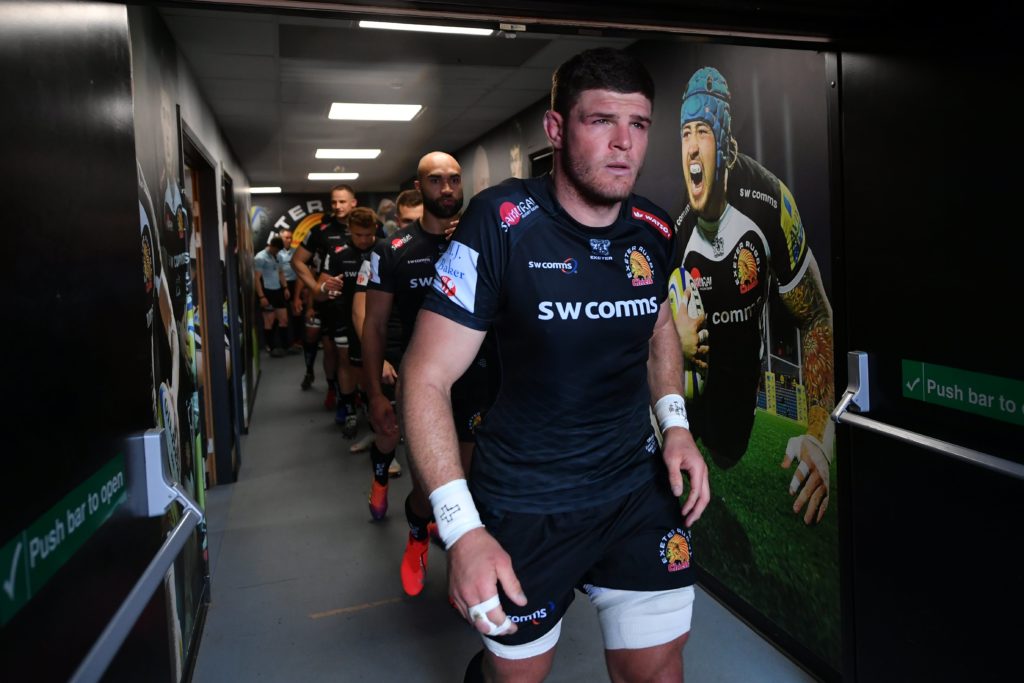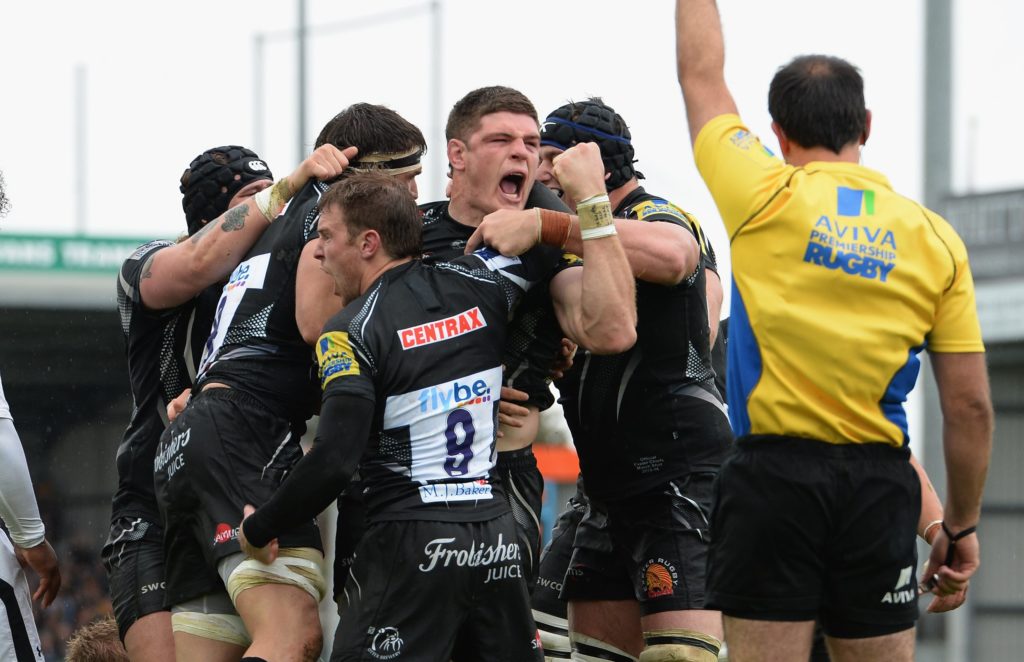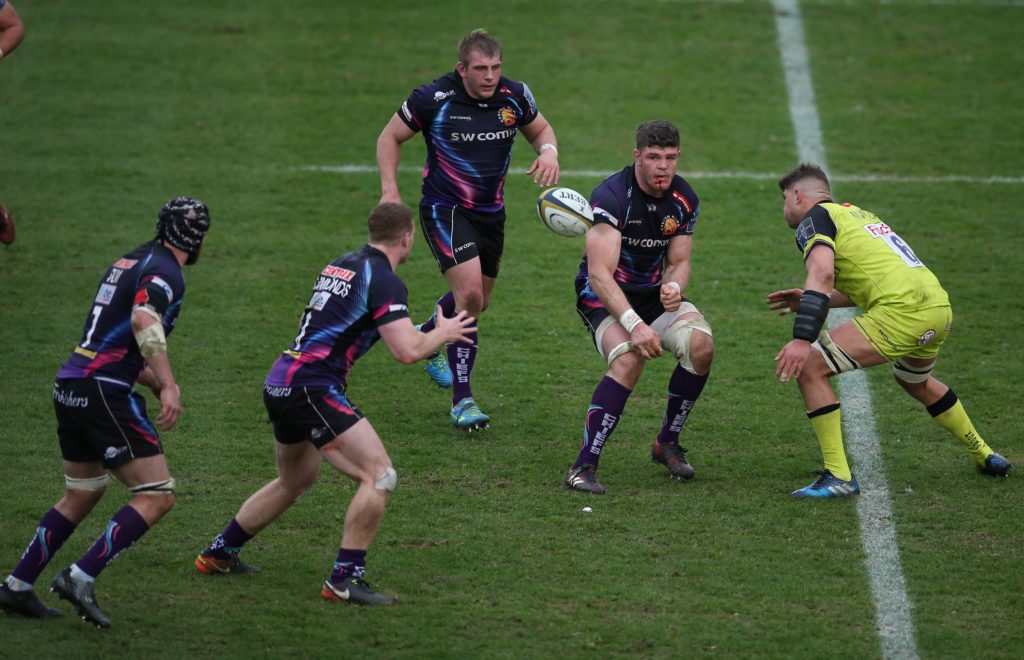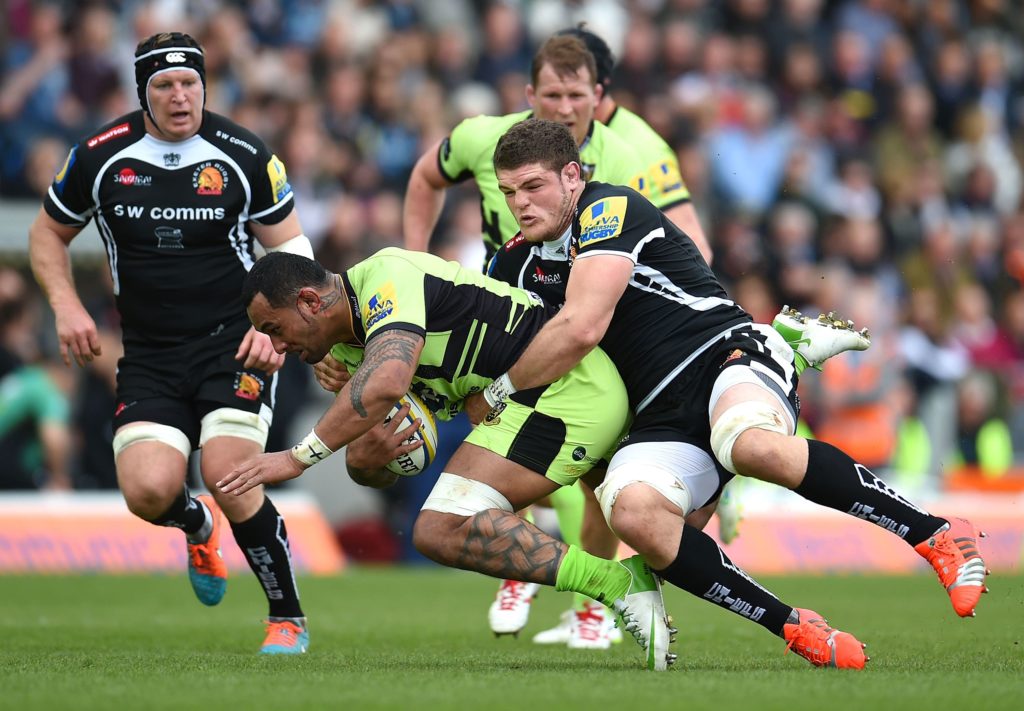Dave Ewers still remembers the day Robert Mugabe’s murderous henchmen came to seize his family farms, booting them off the land they had tended and cherished for decades.
Ewers was only 13 on the Easter weekend of 2003 when the men swarmed on to the property, touting tools and informing his parents in no uncertain terms that they were to pack up and get out. In a heartbeat, his home in the lush eastern plains of Zimbabwe was lost.
Nearly two decades on, even as a pillar of Exeter Chiefs and their glorious rise from the Championship play-off to the Champions Cup final, the chilling ordeal remains forever etched on his psyche.
“Mugabe’s men referred to themselves as war veterans but they were young, they would have been kids at most when the war for independence was won in 1980,” Ewers tells The XV.
“They came in and took over the farm. They just moved on and started building their houses. The way it happened, Mugabe would give certain farms to certain mates, they would arrive, normally escorted by police.
“The guy that took over didn’t really give us a time limit; he just said he wanted to see the efforts of us moving away. Other families were given 24 hours to get off.
“We moved to the farms where my dad’s mates worked, but I remember after that weekend, as a young kid I asked my dad, ‘What are we still doing here in Zim?’”
In his earliest days, Ewers lived an idyllic existence. He spent every waking childhood moment careering around the farmland on his bicycle. He would marvel at the giraffes that loped in from across the mountain range, and on the neighbouring property, his friends kept and trained elephants used in the television show Wild at Heart.
The often-brutal farm takeovers orchestrated by Mugabe’s regime were a retort to the land-grabs of white settlers dating back to colonial times. The goal was to return chunks of the country to its majority black population. Farmers were supposed to be compensated, but instead, many were slain. Parts of Zimbabwe became a fraught and lawless bloodbath.
The Ewers family fled to Devon, where his grandparents lived. Today, debate still rages over the rightful ownership of sprawling Zimbabwean acreage. Over the border in South Africa, a recent spate of farm murders ignited racially charged riots and widespread fury.
“We were very fortunate to be able to get out as we did,” says Ewers. “It sounds weird saying that when you’ve had everything your family owned taken away from you.
When Mugabe died, I wasn’t happy. And I don’t want to speak for all my family, but I wasn’t rejoicing. I was quite sad in a way, not for him and his life, but the damage he had caused so many people.
“When you compare how we got away to families who have lost loved ones and been punished and abused, we are very fortunate. I never take that for granted, for us to be living here in England all together now.
“A lot of families went through things that…I’m troubled by what happened to us as it is, especially with what is going on in South Africa just now. It’s a shambles.”
When the tyrant died in September last year, Ewers did not celebrate. In truth, he wasn’t quite sure how to feel. The emotions writhed and tangled in his guts. Above all, there was a doleful melancholy for the lives lost and the people oppressed.
“When Mugabe died, I wasn’t happy,” he says. “And I don’t want to speak for all my family, but I wasn’t rejoicing. I was quite sad in a way, not for him and his life, but the damage he had caused so many people and changed the lives of millions with his actions.

“I found myself reflecting on what had happened rather than his actual death. For so many years, everyone seemed happy with how he was running things, we were the bread basket of Africa, and from a selfish point of view the farmers were flourishing. It just made me reflect on what was.”
In the years since being forcefully displaced, Ewers has chosen to savour what his new life gave him rather than lamenting the one that vanished. In a rugby sense, the timing of the move was perfect. It presented a pathway to the professional game that might never have materialised at home.
Ivybridge Community College, the school he attended and played for, became a feeder club for Exeter’s academy the year he rocked up. Quickly, as a hulking teenage No 8, he climbed the ranks and was eventually drafted into Rob Baxter’s squad.
Ewers watched from the stands as the Chiefs clinched promotion from the Championship in Bristol ten years ago. A decade on, they return to the city this Saturday as substantial favourites to claim the European crown against Racing 92, and are fancied even more heavily to smite Wasps and win a second Premiership title the following weekend.
“From the very first day I walked into the club, things Rob instilled then are things he is still instilling now. Working hard for each other and that bond we create between us players. It resonates very well with me and my natural family values.
“I was talking to Ben Moon the other day; we were the young boys back then,” says Ewers. “He was playing, I wasn’t, but I remember being in Bristol in the stands ten years ago.
“It’s kind of fitting that we’re going to be back there ten years later playing in the Champions Cup final.
“From the very first day I walked into the club, things Rob instilled then are things he is still instilling now. Working hard for each other and that bond we create between us players. It resonates very well with me and my natural family values, looking after one another.”
Like all epic voyages, Ewers’ career has not been free from hardship. He missed vast swathes of rugby with four serious knee injuries. He has played in three Premiership finals and lost them all to Saracens.

On Exeter’s grandest day, when they confounded Wasps in the dying embers to win their first English title in 2017, he was hobbling around Twickenham recovering from surgery.
“It’s weird to say, but from a selfish point of view, it was one of the hardest days I’ve had,” he says. “Is it jealousy? I don’t know.
“I couldn’t have been prouder of the boys, but it was a tough day. And I feel for the loved ones that had to put up with me.
“I’d just had my ACL operation, so I drove up to Twickenham with my girlfriend and sister and on the way back the whole time they were telling me I should be happy because my team had just won. The boys were on the p**s for a couple of days and I was at home icing my knee.”
The periods I was out with my knee taught me lessons in life that I wouldn’t have learned any other way. Looking back now, I became very selfish in chasing my goals.
Unity and brotherhood are fundamental tenets, but in this dark abyss, he became abrasive, even self-absorbed. He was obsessed with rugby and with smithereening his targets. He adopted a tunnel-visioned approach at the expense of family, friends and relationships.
Perhaps the horrors of his childhood made Ewers this way. Maybe having so much that he held dear ripped away forced him into control freakery. Nobody would deprive him of rugby and nothing would block his path to glory.
“The periods I was out with my knee taught me lessons in life that I wouldn’t have learned any other way – not that I want to go through them again,” he says. “Looking back now, I became very selfish in chasing my goals because I wanted to achieve what I wanted to achieve.

“It’s quite deep, but I never really thought about how I behaved would affect other people. It did open my eyes to hurting people that I care about, how I came across to others, how I spoke to others, and that other people have feelings too.
“I don’t want to say I regret being like that, because I was driven and I still am. I even had some tough conversations with Rob because when I was coming back from injuries, mentally I was all over the place. My second knee injury was a twelve-week injury and come the twelfth week I wasn’t really close to playing yet.
Rob asked ‘What’s going on, do you not want to play?’ I was just very honest with him: ‘I am shitting myself about playing again.
“Rob asked ‘What’s going on, do you not want to play?’ I was just very honest with him: ‘I am shitting myself about playing again’. It’s a time in my life that made me a better person and a better player.”
When you are “the size of a Jersey cow”, as the wonderful David Flatman once described
Ewers in commentary, gobbling up yards ought to be a major forte. The back-row is among Exeter’s destroyers-in-chief, a 6ft 4ins, 125kg colossus who dynamites defenders and epitomises the relentless nature of their feared red-zone assaults.
Typically, the strike runners lance Exeter into the 22, then the heavy artillery takes over. They pummel and bludgeon and squeeze until the dam breaks and a horde of Chiefs come cascading through it.
But will that telling formula hold firm against a pack as monstrous as Racing’s? Can ruthless, unyielding efficiency trump backline conjurers like Finn Russell and Virimi Vakatawa? Russell’s delicious chip-kick and Vakatawa’s off-load put Juan Imhoff away for the box-office try that felled Saracens and surged the Parisians into the final. There is, patently, plenty more where that came from.
“I always find – and we speak about it quite a lot – that these French sides hurt us when we’ve felt comfortable,” says Ewers. “Once we’ve got into defence and got them in a place where we feel comfortable, it just takes that little concentration slip for them to spot something and go after it and the next thing you know, you’re behind your posts.

“Those are the moments where we have to lift it again. It’s going to be a massively demanding game physically, but also mentally, to keep going. They are at their most dangerous when they have to try something off-the-cuff. You might be suffocating and suffocating them, they have to try something and more often than not it does work.
“Like against Sarries in that last few minutes because Sarries were up on the halfway line defending well, they probably got to the stage where you start to feel comfortable, you just take your foot off the gas a tiny bit and you don’t get enough pressure on Finn Russell and he has that time to perfectly place that kick.”
Rather than the culmination of a decade’s graft and more, Ewers views the next seven days as a new dawn. Exeter may have scaled the mountain, but there is another peak to summit, and another still beyond that.
He respects what has gone before – how could he not when he played such an influential part in it all? – but in his mind, it isn’t about finishing a journey so much as extending it.
“I don’t want to take away from what got us here or from how important the next two weeks are,” he says. “But I do feel like it’s the start of something. We’ve got an incredible young squad and I can see it being a very special, two, three, four years ahead.
“The heartache I’ve had and put my family and loved ones through, hopefully I’ll be able to return home with some medals to say sorry.”
“Anyone that knows me or the boys, or has anything to do with rugby, will know how incredibly exciting the next two weeks are.
“Yes, we’ve got to the final, but no-one is going to say, ‘They were great, they got to the final’. We have got ourselves there, but we need to do it. Certain things in life you can either look back and think ‘what if’ or go and make it happen.
“The heartache I’ve had and put my family and loved ones through, hopefully I’ll be able to return home with some medals to say sorry.”
Come the endgame this Saturday and next, if gold is draped around his neck and joy radiates from his soul, it will all have been worth it. Nothing – not Mugabe’s henchmen, not a creaking knee, maybe not even Russell and his troop of galacticos – looks capable of stopping him.
If you’ve enjoyed this article, please share it with friends or on social media. We rely solely on new subscribers to fund high-quality journalism and appreciate you sharing this so we can continue to grow, produce more quality content and support our writers.


Comments
Join free and tell us what you really think!
Sign up for free